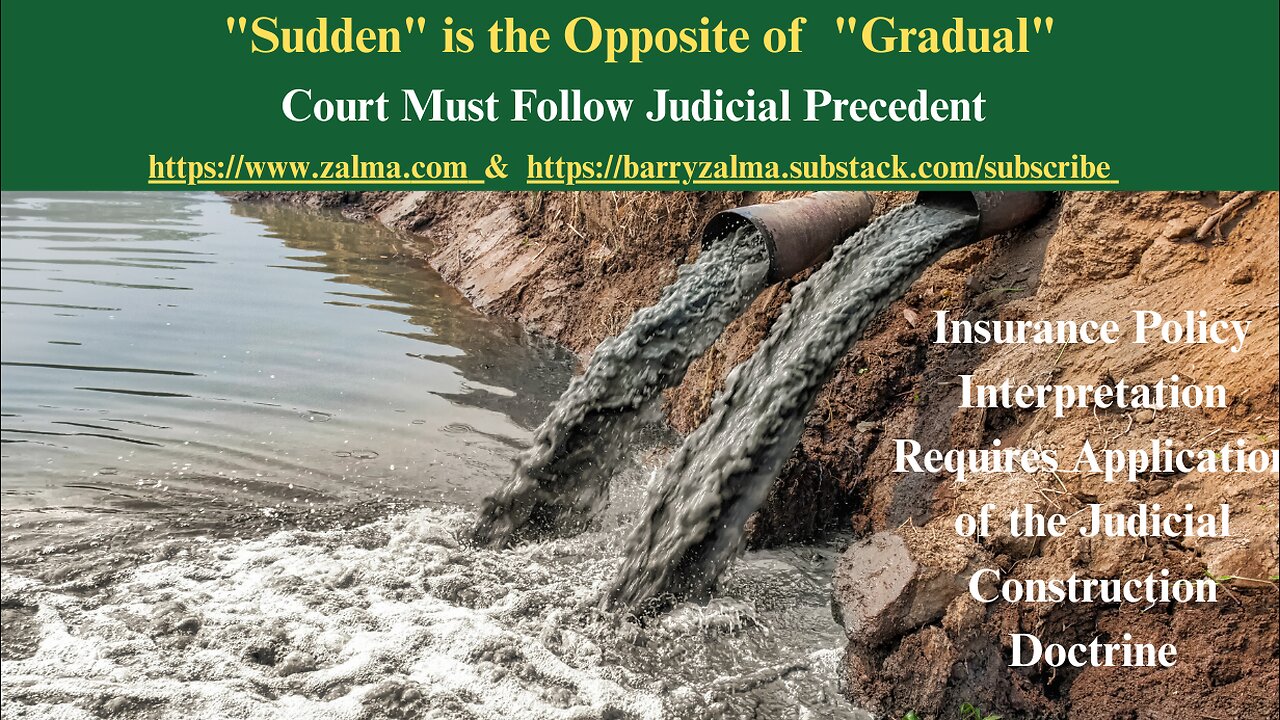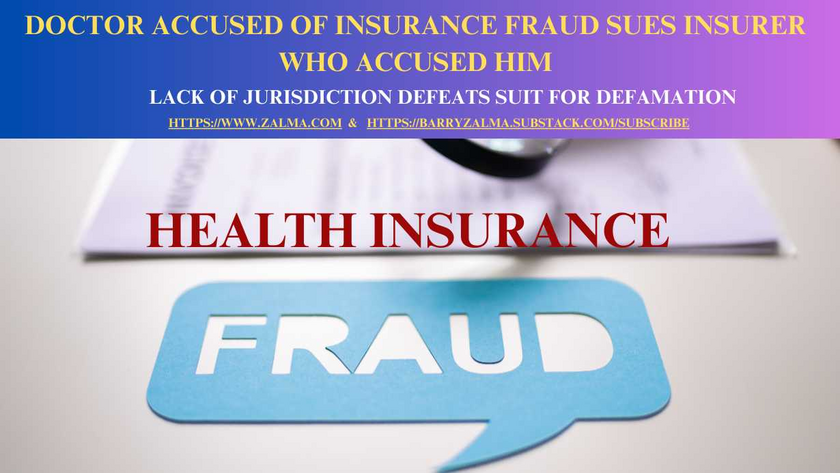
The Eight Corners Rule Strikes Again
Posted on September 22, 2022 by Barry Zalma
See the full video at https://rumble.com/v1ky7jz-duty-to-defend-is-exceptionally-broad.html and at
M/I Homes of Chicago, LLC (M/I Homes), appealed from the circuit court’s entry of summary judgment in favor of Acuity, a mutual insurance company. The circuit court found that Acuity had no duty to defend M/I Homes in an underlying lawsuit-stemming from damages caused by the allegedly defective construction work of one of M/I Homes’s subcontractors- because the complaint in that case did not allege “property damage caused by an occurrence.
In Acuity, a Mutual Insurance Company v. M/I Homes Of Chicago, LLC, and Church Street Station Townhome Owners Association, No. 1-22-0023, 2022 IL App (1st) 220023, Court of Appeals of Illinois, First District, Sixth Division (September 9, 2022) the Illinois Court of Appeals resolved the dispute.
BACKGROUND
The Townhomes’ owners association sued for breach of contract and the implied warranty of habitability against M/I Homes as the successor developer/seller of the Townhomes, and M/I Homes asked Acuity to defend it in that underlying lawsuit, as the additional insured on a policy Acuity had issued to one of its subcontractors, H&R Exteriors Inc. (H&R). Acuity denied that it had a duty to defend M/I Homes under the policy and filed the declaratory judgment suit that is before the court.
The Policy
Acuity issued to H&R a fairly standard commercial general liability and commercial excess liability policy-policy. M/I Homes was listed as an additional insured on the Policy.
The Underlying Lawsuit
The Church Street Station Townhome Owners Association (the Association), by its board of directors, sued for breach of contract (count I) and breach of the implied warranty of habitability (count II). In the amended complaint, the Association sued M/I Homes as the successor developer/seller for the Townhomes, having succeeded to the entire remaining interests of the initial developer/seller, Neumann Homes Inc. (Neumann).
The Association alleged Neumann and M/I Homes constructed and sold Townhomes with substantial exterior defects, including moisture-damaged or water-damaged fiber board, water-damaged OSB sheathing, deteriorated brick veneer, poor condition of the weather-resistive barrier, improperly installed J-channel and flashing, and prematurely deteriorating support members below the balcony deck boards. The Association further alleged that Neumann and M/I Homes did not perform the construction work themselves, but that all work on the Townhomes was performed on their behalf by subcontractors and the designer.
The Association alleged that the property damage was an accident in that M/I Homes did not intend to cause the design, material and construction defects in the Townhomes, and the resulting property damage. The Association claimed damage to other building materials, such as windows and patio doors, including but not limited to water damage to the interior of units, and that the damages were neither expected nor intended from their standpoint.
The Declaratory Judgment Action
Acuity filed its complaint for declaratory judgment against M/I Homes and the Association. The Association is not a party to this appeal.
Acuity sought a declaration that it did not have a duty to defend or indemnify M/I Homes. In turn, M/I Homes filed a counterclaim against Acuity, asking for a declaration that Acuity did owe it a duty to defend.
The parties filed cross-motions for summary judgment. M/I Homes argued in its cross-motion for partial summary judgment that Acuity owed it a duty to defend because the underlying complaint’s allegation that there was damage to “other property” was an allegation of damage beyond just repair and replacement of the construction work. According to M/I Homes, “property damage” caused by an “occurrence” was therefore sufficiently alleged.
The circuit court granted summary judgment in favor of Acuity and denied summary judgment in favor of M/I Homes.
ANALYSIS
The construction of an insurance policy and a determination of the rights and obligations thereunder are questions of law for the court which are appropriate subjects for disposition by way of summary judgment.
The duty to defend is determined solely from the allegations of the complaint. [ISMIE Mutual Insurance Co. v. Michaelis Jackson & Associates, LLC, 397 Ill.App.3d 964, 968 (2009) (citing Thornton v. Paul, 74 Ill.2d 132, 144 (1978), overruled in part on other grounds by American Family Mutual Insurance Co. v. Savickas, 193 Ill.2d 378, 387 (2000).] The duty to defend exists if the allegations in the underlying complaint fall within or potentially within a policy’s coverage provisions, even if the allegations are legally groundless, false, or fraudulent.
In Illinois, the insurer’s duty to defend does not depend upon a sufficient suggestion of liability raised in the complaint; instead, the insurer has the duty to defend unless the allegations of the underlying complaint demonstrate that the plaintiff in the underlying suit will not be able to prove the insured liable, under any theory supported by the complaint, without also proving facts that show the loss falls outside the coverage of the insurance policy. [American Economy Insurance Co. v. Holabird & Root, 382 Ill.App.3d 1017, 1022 (2008).]
The Policy, which is a fairly standard commercial general liability (CGL) policy raises the question of M/I Home’s potential for coverage, and Acuity’s duty to defend, that hinges on whether the underlying complaint alleges “property damage” caused by an “occurrence.”
M/I Homes contends that, based on the Association’s allegations, the underlying complaint sufficiently alleged property damage caused by an occurrence. M/I Homes also argued that this damage to other property was alleged to have been caused by an “occurrence” because the underlying complaint alleged the damage was an accident-caused by the defective work of the subcontractor-that was neither expected nor intended by M/I Homes.
Acuity argued that the allegations of damage to “other property” are not enough to trigger its duty to defend because the allegations are unconnected to a theory of recovery and the underlying complaint fails to both identify the owner of the “other property” and explain how the Association has standing to sue for the damage to that property.
In Travelers Insurance Co. v. Eljer Manufacturing, Inc., 197 Ill.2d 278, 308 (2001), the supreme court held that, in determining whether there was CGL coverage, the predicate of “property damage” is satisfied only “when property is altered in appearance, shape, color or in other material dimension, and does not take place upon the occurrence of an economic injury, such as diminution in value.” The supreme court in Eljer also cautioned against expanding CGL coverage such that it functioned as a “performance bond” for the contractual work of the insured.
Some of our cases have noted that the “other property” requirement is not grounded in the policy language itself. As we have acknowledged, this line of cases establishing an “other property” requirement has been criticized by some commentators.
The underlying complaint in this case contains allegations that could support an obligation to defend M/I Homes. It alleges that “the work of subcontractors and the designer caused damage to other portions of the Townhomes that was not the work of those subcontractors.”
The Association-as “a common interest community association’s board of managers or board of directors” by statute shall have standing and capacity to act in a representative capacity in relation to matters involving the common areas or more than one unit, on behalf of the members or unit owners as their interests may appear.
The threshold for finding a duty to defend is low and any doubt regarding such duty is to be resolved in favor of the insured. Since the Association clearly has standing to act in a representative capacity in relation to matters involving the common areas the allegations of damage to “other property” can be a reference to the Association’s own property in the common areas, and there are no allegations that would clearly exclude coverage.
Accordingly, these allegations are enough to potentially fall within the Policy’s coverage requirement of “property damage” caused by an “occurrence” and thus trigger a duty to defend.
The circuit court’s grant of summary judgment in favor of Acuity was reversed and remanded to the circuit court to enter summary judgment in favor of M/I Homes on the issue of the duty to defend.
ZALMA OPINION
It is almost impossible to refuse to defend an insured based on lack of standing or property damage to property not involved in the loss. In this case the court found a duty to defend because there could be damage to the common property owned by the Association. Unless there is clear and convincing evidence that there is no coverage for defense or indemnity, demands for defense should be resolved with a reservation of rights including the right to demand return of monies paid for defense.
(c) 2022 Barry Zalma & ClaimSchool, Inc.
Barry Zalma, Esq., CFE, now limits his practice to service as an insurance consultant specializing in insurance coverage, insurance claims handling, insurance bad faith and insurance fraud almost equally for insurers and policyholders. He practiced law in California for more than 44 years as an insurance coverage and claims handling lawyer and more than 54 years in the insurance business. He is available at http://www.zalma.com and [email protected].
Subscribe and receive videos limited to subscribers of Excellence in Claims Handling at locals.com https://zalmaoninsurance.locals.com/subscribe.
Subscribe to Excellence in Claims Handling at https://barryzalma.substack.com/welcome.
Now available Barry Zalma’s newest book, The Tort of Bad Faith, available here.
The new book is available as a Kindle book, a paperback or as a hard cover.
Write to Mr. Zalma at [email protected]; http://www.zalma.com; http://zalma.com/blog; daily articles are published at https://zalma.substack.com.
Go to the podcast Zalma On Insurance at https://anchor.fm/barry-zalma; Follow Mr. Zalma on Twitter at https://twitter.com/bzalma; Go to Barry Zalma videos at Rumble.com at https://rumble.com/c/c-262921; Go to Barry Zalma on YouTube- https://www.youtube.com/channel/UCysiZklEtxZsSF9DfC0Expg; Go to the Insurance Claims Library – https://zalma.com/blog/insurance-claims-library/
Montana County Attorney Admits to Insurance Fraud & Is Only Suspended from Practice for 60 Days
Post 5251
Read the full article at https://lnkd.in/gnBaCjmv, see the video at https://lnkd.in/gfpVsyAd and at https://lnkd.in/gC73Nd8z, and at https://zalma.com/blog plus more than 5250 posts.
A Lawyer Who Commits Insurance Fraud and Pleas to a Lower Charge Only Suspended
In The Matter Of: Naomi R. Leisz, Attorney at Law, No. PR 25-0150, Supreme Court of Montana (December 23, 2025) the Montana Office of Disciplinary Counsel (ODC) filed a formal disciplinary complaint with the Commission on Practice (Commission) against Montana attorney Naomi R. Leisz.
On September 25, 2025, Leisz tendered a conditional admission and affidavit of consent. Leisz acknowledged the material facts of the complaint were true and she had violated the Montana Rules of Professional Conduct as alleged by ODC.
ADMISSIONS
Leisz admitted that in April 2022, her minor son was involved in a car accident in which he hit a power pole. Leisz’s son ...
Montana County Attorney Admits to Insurance Fraud & Is Only Suspended from Practice for 60 Days
Post 5251
Read the full article at https://lnkd.in/gnBaCjmv, see the video at https://lnkd.in/gfpVsyAd and at https://lnkd.in/gC73Nd8z, and at https://zalma.com/blog plus more than 5250 posts.
A Lawyer Who Commits Insurance Fraud and Pleas to a Lower Charge Only Suspended
In The Matter Of: Naomi R. Leisz, Attorney at Law, No. PR 25-0150, Supreme Court of Montana (December 23, 2025) the Montana Office of Disciplinary Counsel (ODC) filed a formal disciplinary complaint with the Commission on Practice (Commission) against Montana attorney Naomi R. Leisz.
On September 25, 2025, Leisz tendered a conditional admission and affidavit of consent. Leisz acknowledged the material facts of the complaint were true and she had violated the Montana Rules of Professional Conduct as alleged by ODC.
ADMISSIONS
Leisz admitted that in April 2022, her minor son was involved in a car accident in which he hit a power pole. Leisz’s son ...
Insurer’s Exclusion for Claims of Assault & Battery is Effective
Post 5250
Read the full article at https://lnkd.in/gBzt2vw9, see the video at https://lnkd.in/gEBBE-e6 and at https://lnkd.in/gk7EcVn9, and at https://zalma.com/blog plus more than 5250 posts.
Bar Fight With Security is an Excluded Assault & Battery
In The Cincinnati Specialty Underwriters Insurance Company v. Mainline Private Security, LLC, et al., Civil Action No. 24-3871, United States District Court, E.D. Pennsylvania (December 16, 2025) two violent attacks occurred in Philadelphia involving young men, Eric Pope (who died) and Rishabh Abhyankar (who suffered catastrophic injuries). Both incidents involved security guards provided by Mainline Private Security, LLC (“Mainline”) at local bars. The estates of the victims sued the attackers, the bars, and Mainline for negligence and assault/battery. The insurer exhausted a special limit and then denied defense or indemnity to Mainline Private Security.
INSURANCE COVERAGE
Mainline had purchased a commercial ...
Court Must Follow Judicial Precedent
Post 5252
Read the full article at https://www.linkedin.com/pulse/sudden-opposite-gradual-barry-zalma-esq-cfe-h7qmc, see the video at and at and at https://zalma.com/blog plus more than 5250 posts.
Insurance Policy Interpretation Requires Application of the Judicial Construction Doctrine
In Montrose Chemical Corporation Of California v. The Superior Court Of Los Angeles County, Canadian Universal Insurance Company, Inc., et al., B335073, Court of Appeal, 337 Cal.Rptr.3d 222 (9/30/2025) the Court of Appeal refused to allow extrinsic evidence to interpret the word “sudden” in qualified pollution exclusions (QPEs) as including gradual but unexpected pollution. The court held that, under controlling California appellate precedent, the term “sudden” in these standard-form exclusions unambiguously includes a temporal element (abruptness) and cannot reasonably be construed to mean ...


Lack of Jurisdiction Defeats Suit for Defamation
Post 5250
Posted on December 29, 2025 by Barry Zalma
See the video at and at
He Who Represents Himself in a Lawsuit has a Fool for a Client
In Pankaj Merchia v. United Healthcare Services, Inc., Civil Action No. 24-2700 (RC), United States District Court, District of Columbia (December 22, 2025)
FACTUAL BACKGROUND
Parties & Claims:
The plaintiff, Pankaj Merchia, is a physician, scientist, engineer, and entrepreneur, proceeding pro se. Merchia sued United Healthcare Services, Inc., a Minnesota-based medical insurance company, for defamation and related claims. The core allegation is that United Healthcare falsely accused Merchia of healthcare fraud, which led to his indictment and arrest in Massachusetts, causing reputational and business harm in the District of Columbia and nationwide.
Underlying Events:
The alleged defamation occurred when United ...


Zalma’s Insurance Fraud Letter
Read the full article at https://lnkd.in/dG829BF6; see the video at https://lnkd.in/dyCggZMZ and at https://lnkd.in/d6a9QdDd.
ZIFL Volume 29, Issue 24
Subscribe to the e-mail Version of ZIFL, it’s Free! https://visitor.r20.constantcontact.com/manage/optin?v=001Gb86hroKqEYVdo-PWnMUkcitKvwMc3HNWiyrn6jw8ERzpnmgU_oNjTrm1U1YGZ7_ay4AZ7_mCLQBKsXokYWFyD_Xo_zMFYUMovVTCgTAs7liC1eR4LsDBrk2zBNDMBPp7Bq0VeAA-SNvk6xgrgl8dNR0BjCMTm_gE7bAycDEHwRXFAoyVjSABkXPPaG2Jb3SEvkeZXRXPDs%3D
Zalma’s Insurance Fraud Letter (ZIFL) continues its 29th year of publication dedicated to those involved in reducing the effect of insurance fraud. ZIFL is published 24 times a year by ClaimSchool and is written by Barry Zalma. It is provided FREE to anyone who visits the site at http://zalma.com/zalmas-insurance-fraud-letter-2/
Zalma’s Insurance Fraud Letter
Merry Christmas & Happy Hannukah
Read the following Articles from the December 15, 2025 issue:
Read the full 19 page issue of ZIFL at ...












